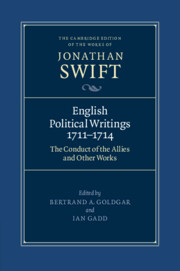Book contents
- Frontmatter
- Contents
- List of Illustrations
- General Editors’ Preface
- Acknowledgements
- Chronology
- List of Abbreviations
- Note
- Introduction
- The Conduct of the Allies
- Some Advice Humbly Offer’d to the Members of the October Club
- Some Remarks on the Barrier Treaty
- The New Way of Selling Places at Court
- Some Reasons to Prove . . . In a Letter to a Whig-Lord
- It’s Out at Last: Or, French Correspondence Clear as the Sun
- A Dialogue Upon Dunkirk, Between a Whig and a Tory
- A Hue and Cry After Dismal
- A Letter From the Pretender, to a Whig-Lord
- A Defence of Erasmus Lewis, or The Examiner (2 February 1713)
- Vote of Thanks by the House of Lords (9 April 1713) and The Humble Address of the . . . Lords (11 April 1713)
- The Importance of the Guardian Considered
- The Publick Spirit of the Whigs
- A Discourse Concerning the Fears From the Pretender
- Some Free Thoughts Upon the Present State of Affairs
- Some Considerations Upon the Consequences Hoped and Feared from the Death of the Queen
- Contributions to the Post Boy and the Evening Post
- Textual Introduction and Accounts of Individual Works
- Textual Introduction Ian Gadd
- The Conduct of the Allies: Textual Account
- Appendix: Transcripts of the British Library Manuscripts of the Vote of Thanks and The Humble Address of . . . the Lords
- Bibliography
- Index
Some Reasons to Prove . . . In a Letter to a Whig-Lord
Published online by Cambridge University Press: 02 September 2021
- Frontmatter
- Contents
- List of Illustrations
- General Editors’ Preface
- Acknowledgements
- Chronology
- List of Abbreviations
- Note
- Introduction
- The Conduct of the Allies
- Some Advice Humbly Offer’d to the Members of the October Club
- Some Remarks on the Barrier Treaty
- The New Way of Selling Places at Court
- Some Reasons to Prove . . . In a Letter to a Whig-Lord
- It’s Out at Last: Or, French Correspondence Clear as the Sun
- A Dialogue Upon Dunkirk, Between a Whig and a Tory
- A Hue and Cry After Dismal
- A Letter From the Pretender, to a Whig-Lord
- A Defence of Erasmus Lewis, or The Examiner (2 February 1713)
- Vote of Thanks by the House of Lords (9 April 1713) and The Humble Address of the . . . Lords (11 April 1713)
- The Importance of the Guardian Considered
- The Publick Spirit of the Whigs
- A Discourse Concerning the Fears From the Pretender
- Some Free Thoughts Upon the Present State of Affairs
- Some Considerations Upon the Consequences Hoped and Feared from the Death of the Queen
- Contributions to the Post Boy and the Evening Post
- Textual Introduction and Accounts of Individual Works
- Textual Introduction Ian Gadd
- The Conduct of the Allies: Textual Account
- Appendix: Transcripts of the British Library Manuscripts of the Vote of Thanks and The Humble Address of . . . the Lords
- Bibliography
- Index
Summary
A LETTER TO A WHIG-LORD
MY LORD,
The Dispute between your Lordship and Me, hath, I think, no manner of Relation to what, in the common Style of these Times, are called Principles; wherein both Parties seem well enough to agree, if we will but allow their Professions. I can truly affirm, That none of the reasonable sober Whigs I have conversed with, did ever avow any Opinion concerning Religion or Government, which I was not willing to subscribe; so that, according to my Judgment, those Terms of Distinction ought to be dropped, and others introduced in their stead, to denominate Men, as they are inclined to Peace or War, to the Last, or the Present Ministry: For whoever thoroughly considers the matter, will find these to be the only Differences that divide the Nation at present. I am apt to think your Lordship would readily allow this, if you were not aware of the Consiquence I intend to draw: For it is plain that the making Peace andWar, as well as the Choice of Ministers, is wholly in the Crown; and therefore the Dispute at present lies altogether between those who would support, and those who would violate the Royal Prerogative. This Decision may seem perhaps too sudden and severe, but I do not see how it can be contested. Give me leave to ask your Lordship, whether you are not resolved to oppose the present Ministry to the utmost? and whether it was not chiefly with this design, that upon the opening of the present Session, you gave your Vote against any Peace, till Spain and the West-Indies were recovered from the Bourbon Family? I am confident your Lordship then believed, what several of your House and Party have acknowledged, that the Recovery of Spain was grown impracticable by several Incidents, as well as by our utter Inability to continue theWar upon the former foot. But you reasoned right, that such aVote, in such a Juncture, was the most probable way of ruining the present Ministry. For as Her M——y would certainly lay much weight upon a Vote of either House, so it was judged that her Ministers would hardly venture to act directly against it; the natural Consequence of which must be, a Dissolution of the Parliament, and a return of all your Friends into a full Possession of Power.
- Type
- Chapter
- Information
- English Political Writings 1711–1714'The Conduct of the Allies' and Other Works, pp. 163 - 180Publisher: Cambridge University PressPrint publication year: 2008

